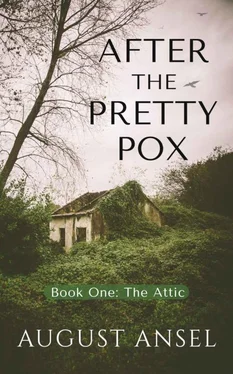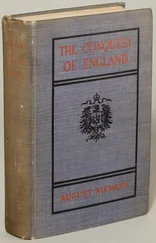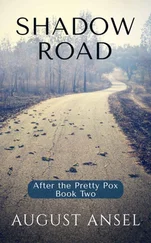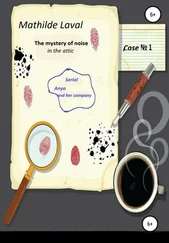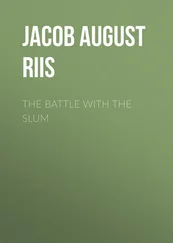When she got to a particular stone (one she’d set alongside a tree herself), she turned toward the river and came out very near the bank. Here, in a natural horseshoe clearing that was virtually invisible from up or down the riverbank, she had set four fish snares. It was passive fishing that required neither her presence nor the need for her to get down into the water, like a fish weir or gill net would do. Each snare consisted of two sticks with notched ends. One stick was pounded into the ground, notch up. A willow sapling, connected to the un-notched end of the other stick by a length of monofilament, acted as a spring. Arie would carefully fit the notches together; a bait line trailed out into the water. When the fish nibbled, the notched sticks came apart and the sapling sprang upright, pulling the fish from the creek. If she was lucky, she got to the dangling fish before a rightful inheritor did. Today she’d been very lucky. Three trout hung above their snares, the gills of one still opening and closing as it tried in vain to breathe the air. Water dripped from its tail, making a dark spot on the duff below.
Arie pulled the fishes free and walked several paces down the creek to clean them. She threw the entrails into the shallows and washed her hands, then rinsed the rocks clean of fish blood and any trace of guts. She wanted to leave as little evidence as possible and to avoid luring a hungry animal to her catch. A big-leaf maple was in the process of throwing off its massive cargo of brown and yellow leaves. She picked several that were still clinging to the branches and wrapped the little trout before stowing them in her basket. She returned to bait and reset the snares, hooking the notched sticks with particular care.
She worked her way back to the path and followed it down to the creek. She hung back in the brambles, again squatting and scoping the bank, first south and then north. Satisfied, she ducked under a low-hanging manzanita and out into a miniature meadow. It was risky here—she was terribly visible—but this was an area the rabbits loved. Set around the edge of the clearing, her traps were almost identical to her fish snares, catching small game that ran for the trees when spooked by predators. These required taller saplings to lift the captured animal out of reach of hungry opportunists—dogs, wolves, raccoons. Arie walked the perimeter of the clearing and found the first snare still set. She’d have to relocate it soon, since it had only ever caught a small partridge, one with no more meat under its feathers than a pigeon. The second trap was twenty long paces from the first. Before she got halfway there she could see it was sprung, and hoped for something edible.
But the snare line was empty. She examined the trip wire. In the loop, a bit of sticky blood and scrim of soft fur. So something had been in the trap, but then? Had a rabbit somehow managed to work itself loose? She’d seen one twist and thrash until its ankle was rubbed to the bone by the trip wire, but the slipknot worked too well, tightening relentlessly no matter how slick with blood. Arie held the loop in one hand and looked around at the ground for some clue to tell her where her prey had gotten to.
“I had to take it.”
She turned, the short spear in hand before she was all the way around. The man stood five yards into the trees, both hands slightly raised (and empty, she was glad to see) so that she could see the palms. He crouched just slightly, springy through all his limbs. The look on his face was wary but curious, ready for her. In the fraction of time it took to register his presence, it was clear that he blocked her way back to the path, and even if she managed it he could outrun her. She stood bolt upright, returned the short spear to her belt, and pulled open the laced front of her blouse. The skin over her heart had the same tattoo as her inner forearms: a deep-red null sign.
“I am only a sojourner. Pilgrim, will you give me rest?”
Uncertainty flickered over his face, and he looked away, staring into the middle distance. “I, uh—” he hesitated. “I can’t.” Then he snapped his fingers. “Rest is not mine to give.” Triumphant, as though he’d found the answer to a difficult examination.
Arie pulled her blouse closed and rested her hand on the shaft of the short spear. “So where is that rabbit?”
“We ate it for breakfast. Nothing left over, either.”
“It’s your rabbit now, then. If you filch my traps, you’ve interfered a good deal with my journey,” she said. “Reckon the woods are big enough and bountiful elsewhere for you and yours.” She fought a hair-prickling urge to glance around her for others.
“I had to feed the girl.”
“Whose is she?”
He shrugged. “Nobody’s, I’d say, from the state of her leg. Dog-chewed. She may live yet.”
“Not long, likely, if she hasn’t yet learned to climb a tree to get a dog off her. Others?”
“Only her and me.”
“She’s yours then.”
“Not until I found her, bit that way.”
“Will you keep her?”
“I can’t leave her. She took a fever.”
“That’s your path, I suppose. I have my own. Go off a ways, is my request.” She kept her hand on the short spear and adjusted the straps of her carry basket as she eased to her left, aiming for the path. “Let me work this bit of dirt in peace, if you mean well. Do you? You haven’t murdered me yet.” Her whole attention was on the shape of him in the corner of her eye and the sounds all around her as she backtracked, one deliberate step at a time, not turning her back, but not obviously watching him as she went.
“But I’ve come for you, Arie.”
How long since her name was spoken to her? A few times here and there during the short days of ravaging, and likely not at all since. She faced him again. “How is it you call me by name?” He took a step toward her, but she lifted a hand to stop him. “Just tell it.”
He cocked his head and blinked at her. “I suppose you wouldn’t know me. I was born six years after you left Daddy Mack.”
She saw it in him, then, in this young man. It was the square set of his face, the eyes narrow as any animal peering out of its den. High cheekbones and thin, straight hair and long beard the color of strong tea. It was his father’s face, made over more kindly perhaps, the mouth set in a straight line rather than fat-lipped and self-satisfied. “So,” she said. “My brother.” She calculated a moment, thinking back at the state her mother had been in when Arie’d left God’s Land. “You’re William.”
“William that’s called Handy,” he agreed. “I’ve come to find you.”
“You’ve found me. It’s no secret where—I’ve been in Granny and Pop’s house since I struck out from God’s Land.”
He nodded. “But no way to know if you survived.”
“I did. And you.”
“Daddy Mack says it’s in the blood.”
“So he lived.”
“He did. Not all of us, though. Some took it quick.”
“Everyone who died took it quick. And the rest?”
“Some gone. Some not gone. Daddy Mack sent me for you.”
“To bring me back there?” She chuffed laughter. “Not on the best day, nor on the worst. I shook the dust of God’s Land off my feet a long time hence, though you’re too young to have seen it happen.”
“Sister Ariela—”
She held up a palm again. “Arie is enough. I’m old enough to be your mammy, and a perfect stranger.” She turned from him and made for the path. “Go well, Sojourner. You and her. Rest is not mine to give, nor succor either.” She looked back only once. William was moving into the trees. His hair hung down his back in a stringy plait, its pale color blending with the no-color of his shirt. “Appears you turned out fine,” she said. “A good one, maybe. Not like him.” He ducked into the scrub without another word.
Читать дальше
